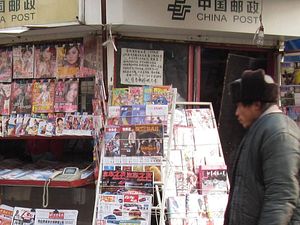Trans-Pacific View author Mercy Kuo regularly engages subject-matter experts, policy practitioners, and strategic thinkers across the globe for their diverse insights into U.S. Asia policy. This conversation with Kecheng Fang – Ph.D. candidate at the Annenberg School of Communications, University of Pennsylvania and formerly a political journalist at Southern Weekly (Nanfang Zoumo) – is the 118th in “The Trans-Pacific View Insight Series.”
Briefly describe China’s traditional and digital media market landscape.
China has a highly regulated media market, where traditional and digital media are subject to different sets of rules. All traditional media (newspapers, magazines, radio and TV channels) are state-owned. Although a large part of print media are called “market-oriented media” and rely on advertising revenues just as their counterparts in the West, they – including the outspoken ones such as Southern Weekly – nevertheless are owned by the party-state.
On the other hand, the most well-known and popular digital media, such as Tencent, Sina, Sohu, and Jinri Toutiao, are private or publicly traded companies. However, they are not allowed to hire journalists and publish original stories. They can only aggregate news stories from traditional media and state-owned digital outlets such as Xinhuanet.com, People.com.cn, and Thepaper.cn.
During recent years, there is an increasing number of “self-media” (zi meiti), which are highly influential on social media platforms including Weibo and WeChat. These “self-media” are mostly very small groups or even individuals who write opinion pieces or produce short videos. Like Maria Repnikova and I argued, although most of the content is light entertainment, bits and pieces of politics make it in that wouldn’t otherwise be found in traditional media.
How do new online media outlets compete with traditional state-run media organs?
Most of the commercial digital media are publishing some original content in a quasi-legal way – mostly on non-political issues including entertainment, sports, technology, and finance, or under the cover of “non-fiction writings.”
But the most competitive feature is not the content, but the fact that they own the major platforms. The news apps of Jinri Toutiao, Tencent, Sina, Sohu, and iFeng are ranked the top ones in app stores, and Sina and Tencent have Weibo and WeChat in their hands. As more and more Chinese read news on their smartphones, editors and algorithms of these commercial digital media overwhelmingly determine what Chinese people read every day. Not surprisingly, the state enforces strict censorship on them and punishes them when something sensitive is published. The state also imposes what I call “a super algorithm” on these platforms – the story at the very top of every news website and news app has to be about Xi Jinping.
Explain the timing of China’s new regulation of online news after the recent 19th National Party Congress.
The Cyberspace Administration has been issuing various regulations during recent years. I don’t see particular meaning in the timing of the two new regulations. Instead, I consider them the latest moves of the ongoing process of expanding the Cyberspace Administration’s power and jurisdiction. The process is driven not only by the top leader’s call for stricter control of the internet, but also by the Cyberspace Administration’s own interest.
These two new regulations represent Chinese authorities’ two main approaches in regulating the internet and social media – one by regulating people (other regulations in this category include hiring pro-government commentators and cracking down on liberal opinion leaders), the other by regulating technology and data (other regulations include requiring all internet companies operating in the Chinese market to store data in China and regulating the use of VPNs).
What is the function of “online moderators” in chat forums?
I guess you are referring to content censors. While China does have a large army of censors, online moderators are actually hired by every major internet company across the globe. The only difference is that online moderators in China have to monitor and delete information that is considered politically sensitive to the state, whereas those hired by Facebook and Twitter focus on violent and sexually explicit content. It’s important to note that, although online moderators in China take orders from the authorities, they are hired by internet companies rather than the government. Censoring politically sensitive information creates a heavy financial burden on these companies.
What is the impact of stricter state control over online news sources and more than 550 million Chinese consumers of online news?
It will be increasingly difficult to access foreign news sources from China. Domestic news sources will be increasingly homogeneous in the area of political news. But most online news consumers will not feel bored, because there is an unlimited supply of celebrity gossip, nationalistic pieces, and “chicken soup” stories on digital platforms.

































